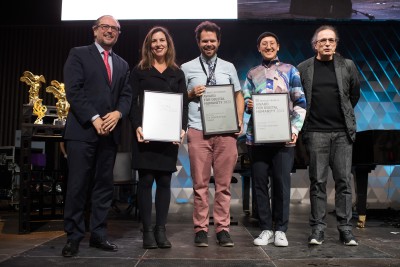Austrian Foreign Minister Schallenberg Presents the Ars Electronica Award for Digital Humanity
Austria's Foreign Minister Alexander Schallenberg presented the Ars Electronica Award for Digital Humanity at the annual Ars Electronica Festival. The award, initiated by the Ministry of Foreign Affairs in 2021, honors projects that demonstrate the importance of cultural exchange for the development of a society-oriented, digital world.
 This year's winner "The Data Nutrition Project" with Foreign Minister Schallenberg (l.). / Picture: © BMEIA Bundesministerium für Europa, Integration und Äußeres / Gruber / Flickr Attribution 2.0 Generic (CC BY 2.0)
This year's winner "The Data Nutrition Project" with Foreign Minister Schallenberg (l.). / Picture: © BMEIA Bundesministerium für Europa, Integration und Äußeres / Gruber / Flickr Attribution 2.0 Generic (CC BY 2.0)
The Ars Electronica Award for Digital Humanity carries prize money of 10,000 euros and is sponsored by the Foreign Ministry's Foreign Culture Division. This year's winner is "The Data Nutrition Project," a transdisciplinary initiative aimed at enabling faster and better evaluation of artificial intelligence training datasets. At the award ceremony in Linz, Foreign Minister Alexander Schallenberg also addressed the State of the ART(ist) call for proposals, through which Austrian cultural diplomacy and Ars Electronica supported artists in repressive systems.
Federal President Alexander Van der Bellen opened the ceremony. He had the impression that "art has become much more political, artists take a stand, interfere, are louder, edgier and more demanding. Art must be promoted and this has been made possible with this project. Diplomacy made it possible to offer a platform for the political and the artistic with the celebration of the annual Ars Electronica Festival.
The development of artificial intelligence has momentous implications for our society. From autonomous robots that recognize and pick ripe strawberries, to heat-resistant swarms of drones to fight forest fires more efficiently, to autonomous cars, the use of this technology continues to grow. However, new technologies, such as artificial intelligence, can also be used to harm humans. This is particularly evident in the case of autonomous weapons systems, for example. The Ministry of Foreign Affairs is committed to ensuring that humanitarian issues are taken into account in these processes from the outset in international forums. By presenting the Ars Electronica Award for Digital Humanity, the Foreign Ministry supports a human-centered approach to innovative technologies.
As Vindobona.org reports, the annual Ars Electronica Festival is a festival of art, technology and society that brings together representatives of the scientific, business, creative and artistic communities from around the world to contribute their perspectives on issues of the future.
However, it is not only new technologies such as artificial intelligence that bring with them the potential to curtail privacy or human rights. Persecution and repression in authoritarian systems also restrict universal rights such as freedom of opinion or artistic expression.
As reported by Vindobona.org, with the State of the ART(ist) call for proposals, the Foreign Ministry supports artists in Ukraine, Russia, Belarus and worldwide who are unable to engage in peace, freedom and self-determination on the ground or can do so only under great threat. In this way, Austria's foreign cultural policy makes a clear commitment to solidarity with artists and cultural workers who are unable to pursue their activities visibly or at all due to political or social circumstances.
BMEIA Federal Ministry for Europe Integration and Foreign Affairs



